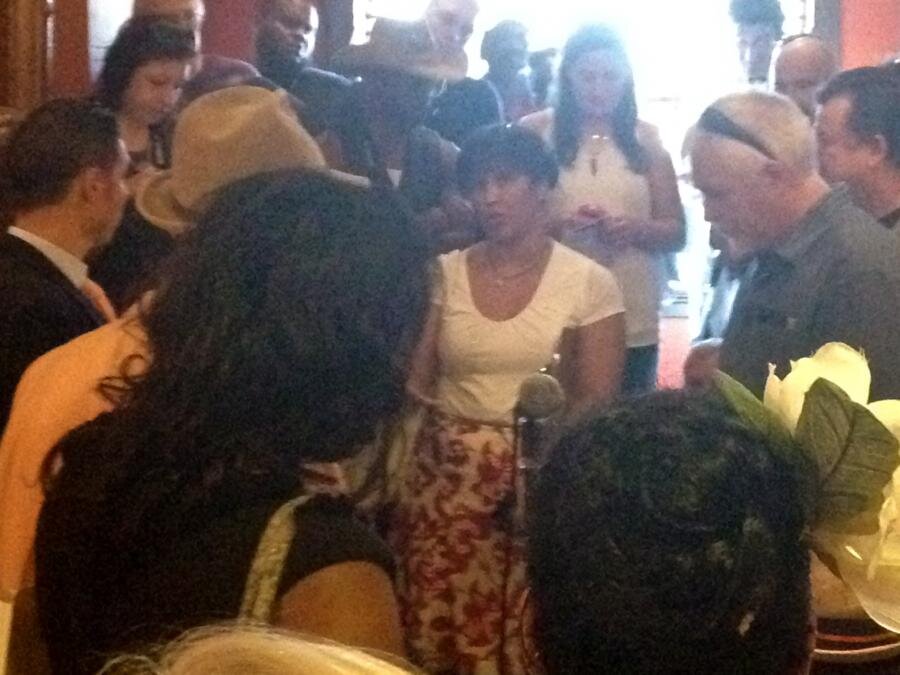Noise About Noise

Members of the New Orleans music business community vented at yesterday's meeting on the city's treatment of live music venues and got results.
It wasn't pretty but it worked. Yesterday, 100 to 150 members of the music community packed into Kermit's Treme Speakeasy to express their outrage at what they perceive as the programmatic harrassment of live music, and whether it's actually happening or not, the anger and the frustration in the room were very real. The meeting was less chaotic than it could have been and often aired grievances only loosely rooted in fact, but by the end of the day, Siberia and Mimi's in the Marigny were informed that they could resume regular programming, Siberia with a temporary live music permit while it goes through the process to get a pernament one. Mimi's presented live music last night and will host DJ Soul Sister's Saturday night party as usual this week.
There were representatives from many area venues present including Three Muses, Cork and Bottle, Siberia, and Mimi's in the Marigny, as well as a number of musicians, writers, lawyers and community activists. The standing room-only crowd filled aisles and gathered across the back of the stage behind a microphone and former Louisiana Music Commission head Bernie Cyrus, who regularly inserted himself derisively into the conversation. "This is the culture that made the city great," he said. "They're trying to kill the golden goose, and it's absurd."
The hostility peaked when Scott Hutcheson from the Mayor's Office for Cultural Economy came to the front of the room to take questions and hear comments. When he explained, "The government does three things: we permit, we protect, we enforce," he was cut off by someone who demanded, "What are you protecting us from? Our culture? What's wrong with you people?"
The talk highlighted the profound culture clash as the improvised nature of music and bars - some of which evolved into live music venues out of necessity and/or opportunity - bumps into government's methodical nature. "It's not a music permit; it's a zoning permit," Hutcheson said. "It's more of a process about where you are than what you do." Under previous administrations, this confrontation was less profound, but a more capable administration has been more able in its role, which has led to some city actions and prompted others to change their own live music programming out of concern for what might happen.
Not surprisingly, tempers flared regularly, particularly over the tension between the role music plays in the city's marketing and the shabby treatment those in attendance feel it receives. "We are enforcing laws that are 50, 60 years old that don't have anything to do with our reality right now," writer Deborah Cotton said. "If you're going to after musicians or clubs or street vendors and make sure they're in compliance, before you do that City Hall needs to scale up its efforts so that you create a process so that venues that are already live and available can go in and fast-track their process. On one hand, you're promoting culture to the world in order to beef up our economy; on the other hand, you're punching culture bearers."
Precision with the facts was sometimes wanting, but there was no shortage of passion as grievance after grievance was aired. Hutcheson told the crowd that there are plans for a zoning/permiting one-stop that should be ready and active in October, and there would be a meeting held later in the day regarding a moratorium on enforcement actions - a meeting that led to the decisions regarding Siberia and Mimi's.
The gathering had a meta dimension as people recognized the need to pull together, then unified only under the umbrella of dissatisfaction. When lawyer Ashlye Keaton said that we need specific requests that we can take to the city, Cyrus interpreted and endorsed that thought as, "Yeah! We need a slogan!" And that was followed by another chorus of injustices.
"The reason VCPORA [Vieux Carre Property Owners, Residents and Associates] and FMIA [Faubourg Marigny Improvement Association] get anywhere is because they represent votes," said OffBeat publisher Jan Ramsey. "If people in this room organized and went before City Council and said, 'We're a group with a name,' then you'd have power. Power is in votes."
"This is happening because other special interest groups are way more organized than we are," said Keaton.





